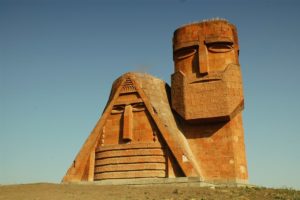 By Raffi Elliot
By Raffi Elliot
There is still no universal consensus on how to define the series of military actions between Azerbaijani and Armenian forces during the first week of April. Is it an escalation of a dormant hetero conflict? A spike in hostilities? Or a second Karabagh War? One thing that we can agree on is the different impact this event has had on Armenian civil society and policy makers as a whole. The entire Armenian nation spread across continents focused its attention on Karabagh for a week; sharing and swallowing any bit of information, speculating about strategies, causes, casualty figures, and scrambling to help the families of the victims.
Citizens organized donation drives, and relief efforts in an impressive display of spontaneous civil society mobilization, while thousands volunteered for service, to the point of overwhelming recruiters with applications. With the support of their compatriots around the world, the defenders of the beleaguered Nagorno-Karabagh Republic were once more able to repulse their enemy.
Hundreds of deaths, and millions of dollars in damage later, the front is now stable, pretty much where it was at the beginning of the month. These four days of war have made me consider four observations about Armenian society which should address:
1- Solidarity with the military doesn’t mean approval of the State









